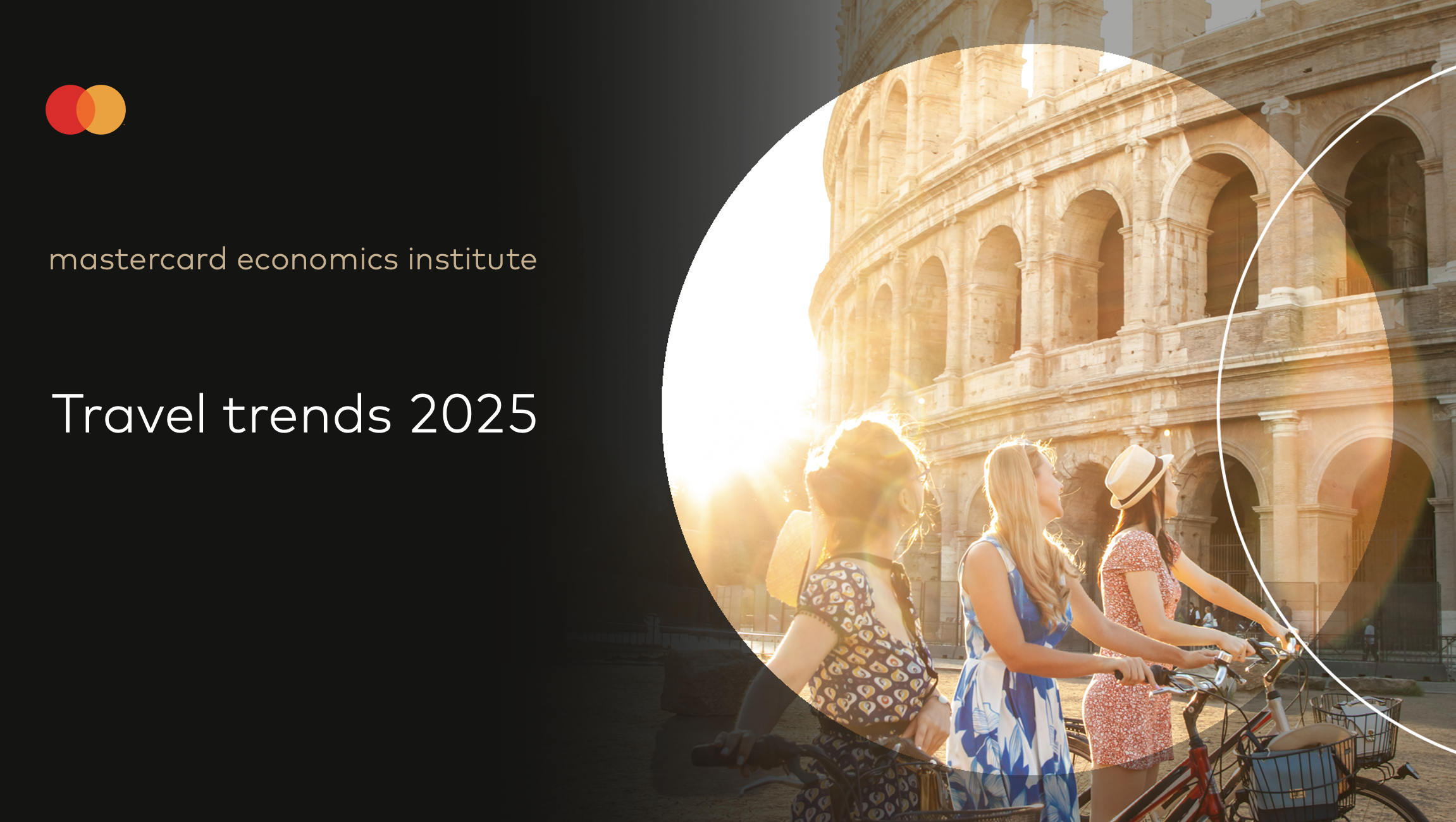European Travel in 2025: Mastercard Economics Institute reveals a shift toward Wellness, Nature, and Bucket-List Dreams
May 12, 2025 | Waterloo, Belgium
The Mastercard Economics Institute (MEI) today released its annual Travel Trends Report 2025 of global consumer spending insights, revealing that Europeans are prioritising deeper, value-led motivations—seeking connection, wellness, sport, adventure, and culinary pursuits. While exchange rates and geopolitical dynamics can influence consumer behaviour, the report highlights that passions and purpose-driven experiences remain strong drivers shaping the travel industry.
Europe continues to stand out as a premier global tourism hub, with its rich culinary heritage, diverse landscapes, and wellness offerings attracting travellers from around the world.
Drawing on a unique analysis of aggregated and anonymized transaction data and third-party data sources, the report uncovers what is shaping travel choices today. Key European findings include:
Sports fandom fuels travel. MEI examined spending within five miles of the venue for the Champions League Final in London in the five days before and after the event. Real Madrid’s victory over Borussia Dortmund led to a 61% YOY increase in German spending, outpacing the overall increase of 14%, whereas Spanish spending spiked by 148% YOY, suggesting fans celebrated by splurging.
Trending summer spots for 2025. Flight booking data reveals the top trending destinations with increasing tourism demand for June-September travel. For European travellers, Tokyo, Palma de Mallorca, Osaka, Hurghada, Beijing, Paris, Larnaca, and London top the list. Notably, Tirana in Albania saw the largest increase in European visitors from 2019 to 2024—led primarily by Italian tourists—making it one of the fastest-growing urban destinations on the continent.
Italy and Poland on the rise for wellness travel: According to Mastercard’s Experience Economy in Europe latest survey, travel, outdoor activities, and dining top the list of spending priorities for Europeans in 2025—underscoring a shift toward experiential and values-based travel. Two-thirds (70%) of Europeans say checking off bucket-list activities is a top priority. Measuring this trend through cross-border consumer spending, MEI developed the Wellness Travel Index (WTI) of destinations leading the way in wellness experiences and self-care1. The rising WTI score for Italy and Poland suggests these European destinations are pivoting to meet this popular trend.
Istanbul, Cannes and Interlaken are top three cities for international foodies. With the popularity of international travel, measuring the median number of nationalities at each restaurant per city sheds light on the most globalized foodie destinations. MEI found that Istanbul's restaurants hosted tourists from 67 countries in 2024, the highest among 43 cities measured. Six more European destinations - Cannes (France), Interlaken (Switzerland), Barcelona (Spain), Dubrovnik (Croatia), Greece (Mykonos) – appear in the top 10, each drawing global visitors to their vibrant culinary scenes.
Nordic adventures gain global popularity. Analysing major national parks on how commerce in the area is contributing to overall tourist expenditure2, MEI found adventure tourism is booming in the Nordics region, where travellers seek out the natural beauty of its forests, fjords, and outdoor serenity. Finland stands out, with national parks accounting for 7.1% share of total cross-border spending. Other notable European countries with spending shares tied to national parks include Switzerland, Poland, France, and Norway.
Fraud abroad. According to MEI, fraud in popular tourist destinations spikes by up to 28% during peak seasons. Digital wallets and AI-driven fraud prevention are helping to protect travellers.
Corporate travel is less frequent, but trips are longer. According to MEI, U.K. corporate flight bookings show the average business trip now lasts longer than before the pandemic. For U.S. travellers, trips to Europe grew from 7.443 to 8.154 days. This trend applies to U.K. travellers too, except for trips to Canada and the U.S., which shortened between 2020 and 2025.
“Europe's travel sector continues to demonstrate remarkable resilience” said Natalia Lechmanova, chief economist Europe at Mastercard Economics Institute. “Even in the face of economic uncertainty, we’re seeing a clear pivot among European travellers toward experiences that deliver personal meaning and long-term value. Whether it’s wellness retreats, cultural exploration, or adventure in nature, European travellers are prioritizing journeys that align with their individual values and aspirations.”
You can view the full “Travel Trends 2025: Purpose-driven journeys” and other reports and insights from MEI, here.
[1] WTI is calculated using the share of cross-border accommodation spending at wellness-related merchants, multiplied by each country’s share of global wellness-related accommodation transaction
[2] The analysis created a boundary box using minimum and maximum longitude and latitude of each major national park, measured spending within boundary box.
[3] Feb 2019-Feb 2020
[4] Mar 2024-Mar 2025
About the Mastercard Economics Institute
The Mastercard Economics Institute provides insights into global and local economic trends using advanced analytics and Mastercard's proprietary data assets. Established in 2020, MEI supports businesses, governments, and policymakers with economic monitoring services and timely analysis on economic themes including consumer spending, retail and travel trends, and other local and global barometers of economic performance. MEI offers valuable perspectives to inform decision-making and promote sustainable growth worldwide through our thought leadership series, and through Mastercard's specialized product offerings.
About Mastercard (NYSE: MA)
Mastercard powers economies and empowers people in 200+ countries and territories worldwide. Together with our customers, we’re building a sustainable economy where everyone can prosper. We support a wide range of digital payments choices, making transactions secure, simple, smart and accessible. Our technology and innovation, partnerships and networks combine to deliver a unique set of products and services that help people, businesses and governments realize their greatest potential.